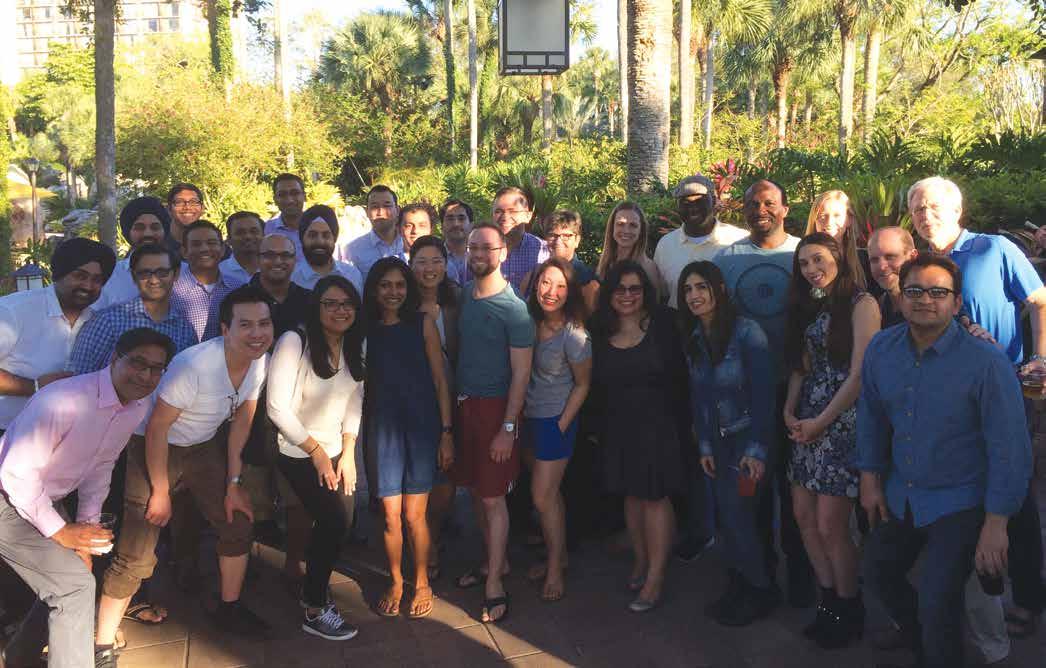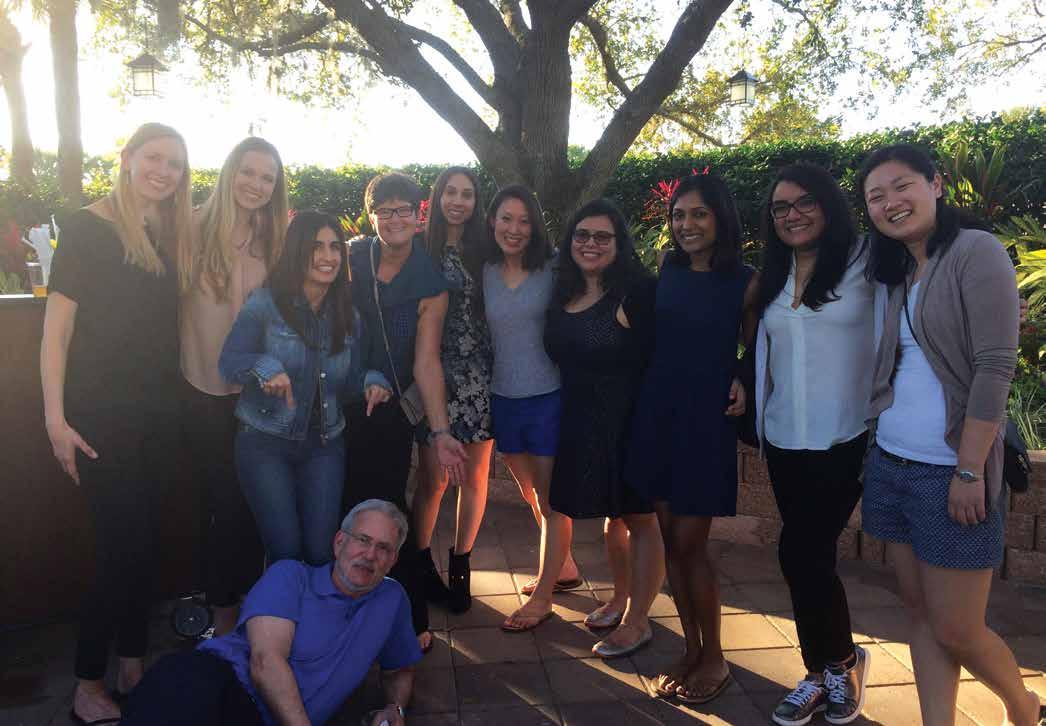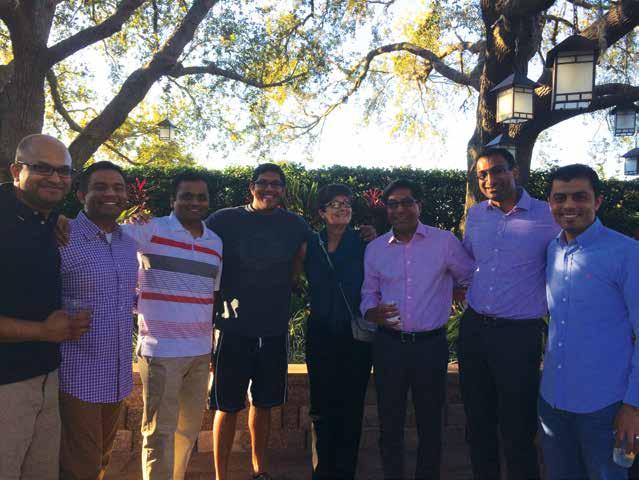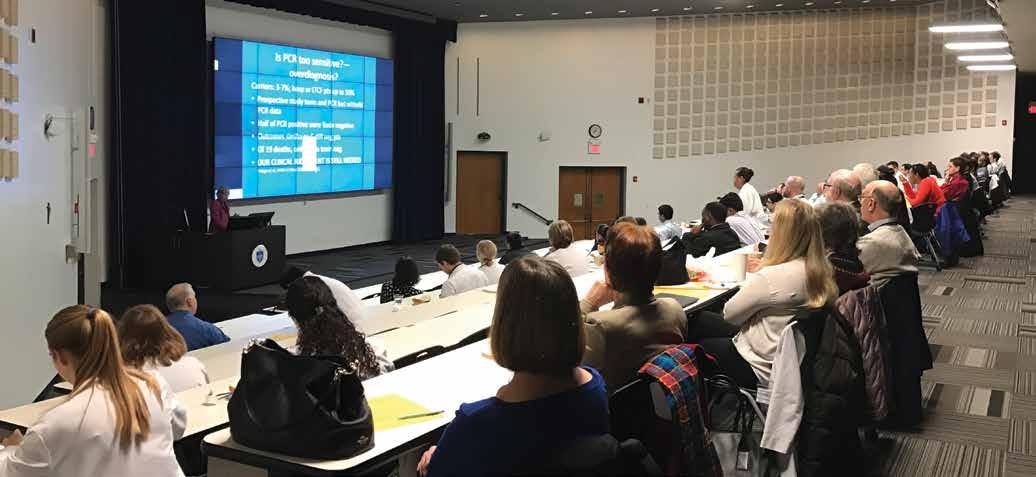
10 minute read
EDUCATION


Focus & Feedback for GI Fellows
27TH ANNUAL NORTH AMERICAN CONFERENCE OF GI FELLOWS GETS HIGH MARKS
AS NETWORKING EVENT
BUILDING PRESENTATION SKILLS AND CULTIVATING AN INTEREST IN CLINICAL RESEARCH among GI fellows-in-training was the goal of ACG’s 27th annual North American Conference of Gastroenterology Fellows (NACGF). Sponsored by the American College of Gastroenterology and endorsed by the Canadian Association of Gastroenterology, NACGF creates an opportunity for GI fellows to present their research, interact with senior faculty, and attend excellent educational programs and breakout sessions.
Co-Chairs of the Educational Advisory Committee Sunanda V. Kane, MD, MSPH, FACG, ACG Vice President, and Philip O. Katz, MD, FACG, Past President (2009–2010) have been involved in this course for many years. This year, David J. Hass, MD, FACG, joined them as a Co-Chair. The 2017 faculty also included ACG President Carol A. Burke, MD, FACG. →
Mentoring and feedback from a distinguished faculty of gastroenterologists is at the heart of this experience. The competition is tough and fellows must submit their projects for consideration. Only 25 fellows are selected to attend and their expenses are covered. This year's conference took place in sunny Orlando, FL, at the Hyatt Regency Grand Cypress Resort, from March 17–19, 2017.
From the perspective of the fellow, the conference's strengths include its small size, the opportunity to present their research to colleagues in a less pressured environment than at national meetings, and receiving coaching on presentation skills from experienced faculty.
Learn more about the NACGF application process:
nacgf.org

NAVIN L. KUMAR, MD
Brigham & Women’s Hospital, Boston, MA
What were the highlights of this experience for you? The NACGF conference is a wonderful opportunity to meet fellows from across the United States and Canada, gain valuable experience in delivering an oral presentation, and interact with faculty members who are leaders in the field of gastroenterology and hepatology. One of the unique aspects of this program is its focus on personal development, as the faculty provide detailed feedback on each fellow’s presentation as well as discuss key principles of becoming a leader during the welcome dinner. The intimate setting allows for all participating fellows and faculty to get to know each other. I actually met a few fellows who would like to expand my project to their training site as well, which was a very humbling and exciting experience. What project/abstract did you present? I presented my educational innovation entitled “The SAFE-T Assessment Tool: A Validated Web-based Application for Evaluation of Gastroenterology Fellow Performance in Colonoscopy.” The tool allows for pointof-care, continuous assessment of fellow colonoscopic skills and is optimized for smartphone use to improve the user experience. We showed this tool to be concise, valid and reliable in a prospective study done at our institution, and are currently in the process of making the tool available for all interested fellowship programs.
What two or three key takeaways from NACGF will help you as you move ahead in your career?
From my experience at the NACGF, I gained confidence in my ability to present my research in an effective manner, developed important collaborative relationships that will enrich my future academic pursuits, and was inspired by the faculty members who were all excellent role-models.
What advice would you give a potential applicant for 2018?
My advice to a potential applicant is to apply! As described above, there are so many wonderful aspects of this program. I hope all interested fellows have the opportunity to participate. The leaders of the program have made the application process very easy and so please don’t hesitate to submit your abstract for consideration—it will absolutely be worth your time.

from NACGF 2017
TOSSAPOL KERDSIRICHAIRAT, MD
University of Michigan School of Medicine, Ann Arbor, MI
What were the highlights of this experience for you? The NACGF experience offered wonderful input on how to build presentations slides and present your works from experienced faculty. For me, the best part was getting to know fellow colleagues from many programs. What project/abstract did you present? My project was, “Development and validation of walled off necrosis scoring system for patients undergoing endoscopic step-up approach.”
What two or three key takeaways from NACGF will help you as you move ahead in your career? For me, NACGF was an opportunity to strengthen presentation skills and get a chance to ask questions in a meeting. I came away from NACGF with a better appreciation for how to develop collaborations and network among institutions.
What advice would you give a potential applicant for 2018? This is one of the best meetings dedicated for GI fellows. Experienced faculty will guide you how to effectively and professionally present your works in national meetings. To my knowledge, this might be the only one conference that can help improve your skillsets from this perspective.
Laura Ulmer, DO
University of Nebraska Medical Center, Omaha, NE
What were the highlights of this experience for you? Having the opportunity to present an oral presentation in a more low-key setting than a national meeting, as well as the feedback received. We were taught not only about how to give our presentation in a more effective manner, but also about presentation and question-answering etiquette—valuable things that are not often taught. Given that this is a small conference, the fellows also had the ability to mingle with the faculty throughout the weekend.
What project/abstract did you present? I presented a project entitled: "Fecal Microbiota Transplant for Clostridium difficile Colitis From Thawed Frozen Stool: Two-Year Real-Life Experience In A Community Hospital."
What two or three key takeaways from NACGF will help you as you move ahead in your career? It’s important to continue to attend conferences such as NACGF in the future, as these opportunities are key for networking in our field. Also, the constructive criticism received will be very helpful in preparing for future presentations with confidence.
What advice would you give a potential applicant for 2018? Don’t be afraid to apply! This was one of the most enjoyable educational experiences I have had the opportunity to participate in.

VISITINGThe ACG Edgar Achkar PROFESSORSHIP
Providing Noteworthy Speakers for Training in Your Communities
ACG Institute educational opportunities aim to reach fellows and community physicians with national experts.
CHRISTINA M. SURAWICZ, MD, MACG
ACG Past President Dr. Christina Surawicz visited Saint Louis University, on February 2–3, 2017, at the request of Christine Y. Hachem, MD, FACG, and Charlene Prather, MD, MPH. The fellows presented Clostridium difficile infection cases, demonstrating appropriate management of challenging cases, and excellent presentation skills. The case presentations were attended by the infectious disease specialist and included probing questions by the fellows.
Surawicz presented “FMT: Use and Misuse” at the GI Grand Rounds, followed by an evening community roundtable dinner on chronic diarrhea challenging cases, with the GI fellows and private practice docs. A talk for the internal medical grand rounds on difficult Clostridium difficile cases was attended by faculty, including the head of transplant, residents and fellows.
One of the visit highlights was interacting with senior, mid-career and junior faculty (in this case all women faculty) at breakfast, and individual meetings. St. Louis also learned of Surawicz's involvement with the ACG, and hopes to continue this tradition of engagement in the life of the College.
“We learned so much about Clostridium difficile infections, role of fecal transplant and chronic diarrhea management. Plus, many of our junior and senior faculty got to meet and talk with Dr. Surawicz, which has already been invaluable in establishing what I am sure will be longlasting relationships.”
—Dr. Christine Y. Hachem


MARTIN L. FREEMAN, MD, FACG
visited MetroHealth Medical Center in Cleveland, OH, on October 18–19. Freeman was requested by GI Fellowship Program Director Alok K. Jain, MD, for his expertise in pancreatobiliary diseases and interventional endoscopy. Freeman provided an evening talk on the evidence-based management of necrotizing pancreatitis, attended by fellows and staff, including one of his former fellows, Brooke Glessing, MD, at Case Western. The next day, grand rounds had the largest audience of the academic year, with attendees from internal medicine, family medicine and surgery. The visit also included one-on-one time with the fellows and a discussion of total pancreatectomy and islet autotransplantation.

“I have to say, of all my years doing visiting professorships and lectures, this Edgar Achkar invited professorship through the ACG at MetroHealth in Cleveland was about the
most enjoyable.” —Dr. Martin Freeman The ACG Institute for Clinical Research and Education, and Director Nicholas J. Shaheen MD, MPH, FACG, are pleased to present the selected 2017 ACG Edgar Achkar Visiting Professorships:
FEBRUARY 2–3
CHRISTINA M. SURAWICZ, MD, MACG
Saint Louis University, presenting on Clostridium difficile. APRIL 20–21
CAROL A. BURKE, MD, FACG
Houston Methodist Hospital, presenting on colon cancer screening, genetics of colon cancer, and hereditary polyp syndromes.
APRIL 25–26
BRIAN E. LACY, MD, PHD, FACG
University of Oklahoma, presenting on IBS and motility.
APRIL 26
LAUREN B. GERSON, MD, MSC, FACG
Advocate Lutheran General Hospital, presenting on diverticular disease, colonoscopy quality, GI bleeding, and refractory GERD.
MAY 18–19
PRATEEK SHARMA, MD, FACG
NorthShore University Health System, presenting on esophageal disease.
MAY 22–23
MARIA T. ABREU, MD, FACG
Augusta University Medical College of Georgia, presenting on IBD.
JULY 18
DAVID T. RUBIN, MD, FACG
The Ohio State University Wexner Medical Center, presenting on IBD.
AUGUST 15–16
STEPHEN B. HANAUER, MD, FACG
University of Virginia, presenting on IBD.
AUGUST 31
AASMA SHAUKAT, MD, MPH, FACG
Northwestern University, presenting on colon cancer.
SEPTEMBER 11–13
ANDREW Y. WANG, MD, FACG
University of Michigan, presenting on endoscopic submucosal dissection.
SEPTEMBER 13–14
NICHOLAS J. SHAHEEN, MD, MPH, FACG
California Pacific Medical Center, presenting on refractory GERD and complicated GERD patients (ablation).
DECEMBER 5–6
MIGUEL D. REGUEIRO, MD, FACG
UT Southwestern Medical Center, presenting on IBD.
Why I give r When I was recently asked why I give to the ACG Institute, so many thoughts came to mind. Since my fellowship more than 30 years ago, the ACG has provided me service opportunities in the College and a professional haven for me to learn about the practical as well as the research aspects of gastroenterology. When the ACG Institute was established over 22 years ago, it provided me the Having served on the board of the ACG Institute, I have been fortunate to see first hand the commitment of the members and staff of ACG Institute to promote public awareness of digestive health as well as education of physicians and other health care providers. In order to achieve the Institute’s mission, I feel that I must make a commitment to give to the ACG Institute. I truly believe that each member of the GI community has an obligation to give back, regardless of the dollar amount, to the Institute.

opportunity to give back to an organization which has been in the forefront of improving patient care and research opportunities for early-stage physicians embarking on their careers.

If we do not support our own, who can we count on to support an organization which has allowed many of us to be successful?
Frank A. Hamilton, MD, MPH, MACG
ACG Institute Board of Directors, 2010–2016 Past Chair, ACG Committee on Minority Affairs & Cultural Diversity Past Chair, ACG Archives Committee
WAYS TO GIVE Join Dr. Frank Hamilton and support the research and education mission of the ACG Institute. Please consider a gift using the envelope inserted in this issue of ACG MAGAZINE, or you can make a taxdeductible gift online at gi.org/donate. The mission of the American College of Gastroenterology Institute for Clinical Research and Education is to promote digestive health through education of the clinician, the patient and the public, to support clinical research and innovation in gastroenterology and hepatology, and to raise public awareness about prevention of digestive disease.




